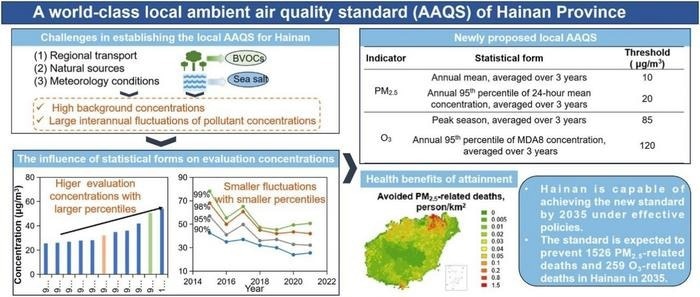Human health is greatly impacted by air pollution, and although China now has relatively high air quality, Hainan Province hopes to lead the world in ambient air quality by 2035. In Hainan, the epicenter of China’s environmental conservation efforts, the current Ambient Air Quality Standards (AAQS) provide inadequate direction for improving air quality even further.
 Graphical abstract. Image Credit: Eco-Environment & Health
Graphical abstract. Image Credit: Eco-Environment & Health
Thus, it is essential to establish the local AAQS for Hainan. In response to the WHO’s updated criteria, this project attempts to address specific regional difficulties in assessing air quality, such as high background pollution levels and other intricate environmental conditions.
In addition to becoming an example for other regions hoping to transcend national benchmarks and reach worldwide air quality leadership, establishing these customized standards is essential for enhancing Hainan’s air quality and health outcomes.
An extensive method for creating local AAQS specific to Hainan Province, China, is presented by a team from Tsinghua University and numerous other Chinese universities in a landmark study that was published in Eco-Environment & Health on October 28th, 2023. The initiative is a component of Hainan’s larger plan to improve the natural environment and attain top-notch air quality by 2035.
First, the research examined air quality standards from various nations and areas, emphasizing the methods used to quantify and control pollution. The researchers proposed new, realistic targets for Hainan’s reduction of prevalent pollutants, taking into account the consequences on health over short- and long-term durations. They developed Hainan’s standards using these objectives, regional statistics, and global recommendations.
The Community Multiscale Air Quality (CMAQ) model is a computer tool that the researchers used to determine whether Hainan can accomplish these objectives. Thanks to this software, they were able to see how various pollution management strategies would affect the quality of the air by 2035. They discovered that Hainan could reach these new, more stringent air quality standards by 2035 with the help of effective measures.
Developing local AAQS is critical for regions like Hainan, where the standard needs to reflect local conditions while aiming for global leadership in air quality. Our research is a step towards achieving that delicate balance.
Bin Zhao, Lead Researcher, Tsinghua University
Hainan Province’s innovative effort in developing local AAQS is a model for other locations throughout the world and is a vital step towards a healthier environment. The province sets out to achieve world-class air quality by 2035 as it works to put these objectives into practice.
According to the study, by 2035, compliance with the revised requirements might avert thousands of preventable deaths yearly as a result of decreased long-term exposure to PM2.5 and O3. This proactive strategy not only sets the stage for other regions to create their own regional air quality standards, but it also promises a better future for the people of Hainan.
Journal Reference:
Song, Q., et. al. (2023) The development of local ambient air quality standards: A case study of Hainan Province, China. Eco-Environment & Health. doi:10.1016/j.eehl.2023.10.002